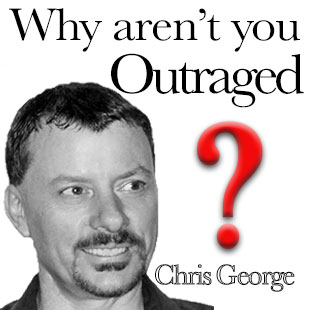
(CHRIS GEORGE / iNFOnews.ca)
May 08, 2018 - 12:00 PM
OPINION
I often wonder how we got to this place. Not this lovely province, but a society where absolutely everything has become political.
People have always had opinions, of course, but it is only recently that we have separated ourselves into groups that are so ideologically hidebound that even basic observations of the natural world have somehow become political positions to be taken up by one side or another. Observations of the natural world have consistently been set aside in order to prioritize our political economy.
Climate change is the ultimate example. It has become the most polarizing political topic of discussion in most countries around the world. In this country, our leadership over the past two decades since Kyoto have paid varying degrees of lip service to the idea of mitigation, but not one of them ever found a way to take meaningful action. Politics has always gotten in the way.
The current government landed with much fanfare in Paris and committed Canadians to act as if we truly meant to somehow cut greenhouse gas emissions in this country. The truth is that we won't be meeting any of our targets; not by 2050 and certainly not by 2030. The Trudeau government's bizarre idea that we somehow need to dump more CO2 and methane into the atmosphere if we are to have any hope of cutting back on dumping CO2 and methane into the atmosphere shows just how ridiculous most politicians can get to be on this topic.
Canada, as Trudeau crowed, is back.
Canadians are among the top emitters per capita of greenhouse gases in the world. We live in a big country and our winters are nothing to sneeze at, putting the need for transportation and home heating at the top of most families list of emitters. We also host carbon-intensive resource extraction industries. Many arguments have been made against us taking action if it in any way impedes our ability to wrest more wealth from the ecosystems around us. Some even think that Canadians acting together cannot have a meaningful impact on global emissions, so why even bother trying.
All of these arguments put our observations and what they tell us about the world we live on at the back of the bus. It is almost as if we somehow think that if we believe in our human constructs hard enough that the real world will go away and leave us alone. It isn't.
Last month marked the first time in 800,000 years that CO2 in the atmosphere reached 411 parts per million. And CO2 isn't the only greenhouse gas. The 800,000-year ice core record shows that we are also living with levels of atmospheric methane far higher than anything seen in that record. The levels today are almost three times higher than they were 330,000 years ago, the previous peak concentration during the ice core record.
Considering that our species only arrived on the scene 300,000 or so years ago, we are truly in uncharted territory. Is this terrifying? Of course. Has anything about our knowledge of it changed in the past fifty years? No. It was just as terrifying then as it is now.
But fifty years ago the projected impacts were still far in the future. Even as recently as Kyoto, scientists still used 2100, a date safely past the expected lifespan of most everyone able to vote in 1997, as the magical date when we might actually become inconvenienced by our pollution. The Arctic, for example, is well on its way to beating the "ice free summer" prediction of 2100 by a wide margin.
Observations over the past decade have seen us blow right through many of those projections. "Unprecedented", "Sooner Than Expected" and "Second 100 Year Storm this Year" have become standard fare in headlines in the media. That the scientists were right in their predictions is buried under just how wrong they were on the timing. The truth is that they have been collectively far too conservative in their message to the general public.
The basic implications of these observations should not be denied. What we do politically and economically matters in the real world. Pretending it doesn't isn't a very smart position to take. Resources deplete. Waste sinks fill up. Not addressing this reality is not going to end well for any of us. It is time to recognize that whether we choose to put the natural systems we depend on before our economy or not, the consequences are already here all around us.
We only have to look.
— Chris George believes one measure of a just society is found in how well it balances fiscally conservative economics with social responsibility and environmental soundness in all of its living arrangements.
We welcome your comments and opinions on our stories but play nice. We won't censor or delete comments unless they contain off-topic statements or links, unnecessary vulgarity, false facts, spam or obviously fake profiles. If you have any concerns about what you see in comments, email the editor.
News from © iNFOnews, 2018